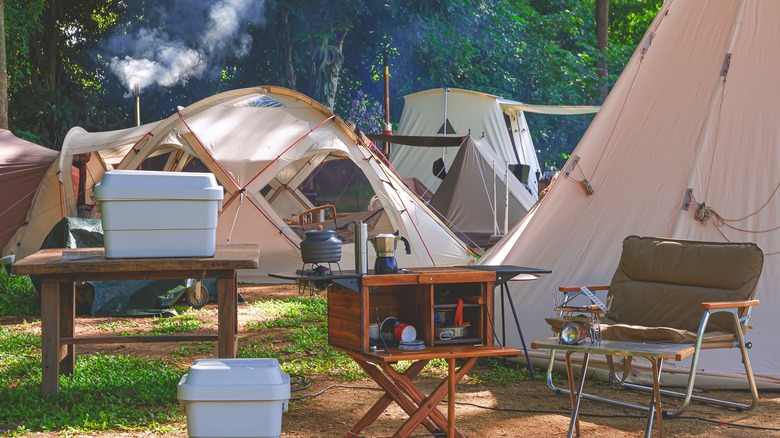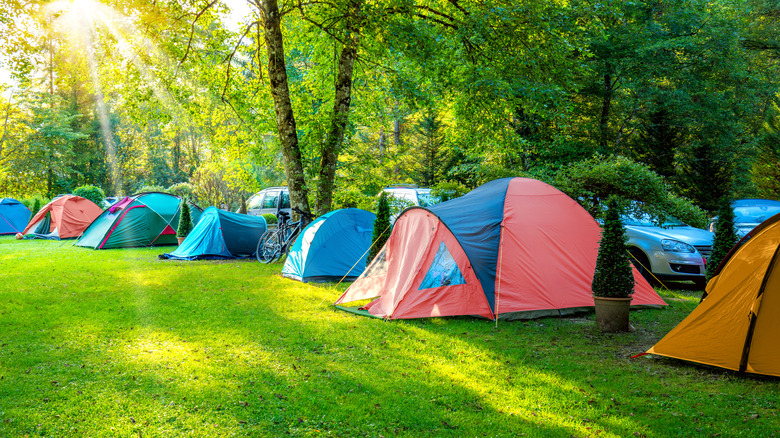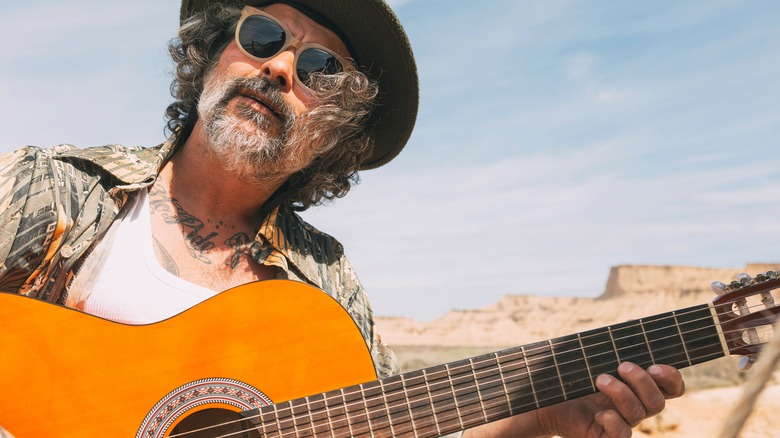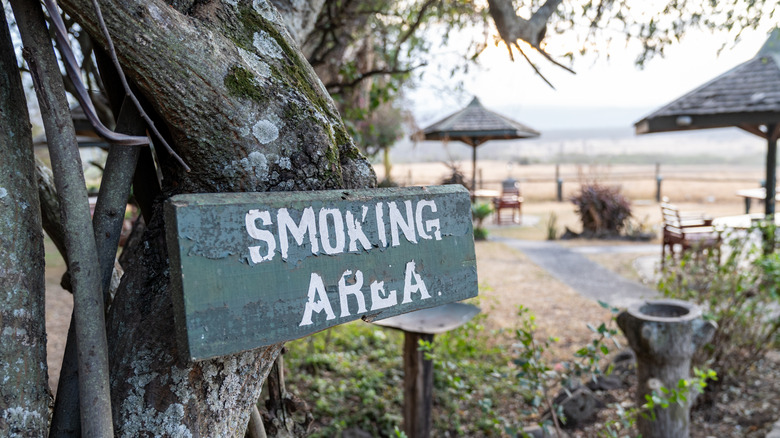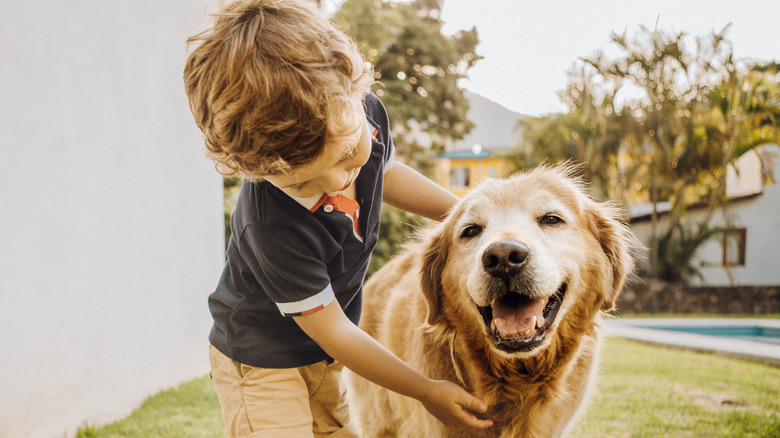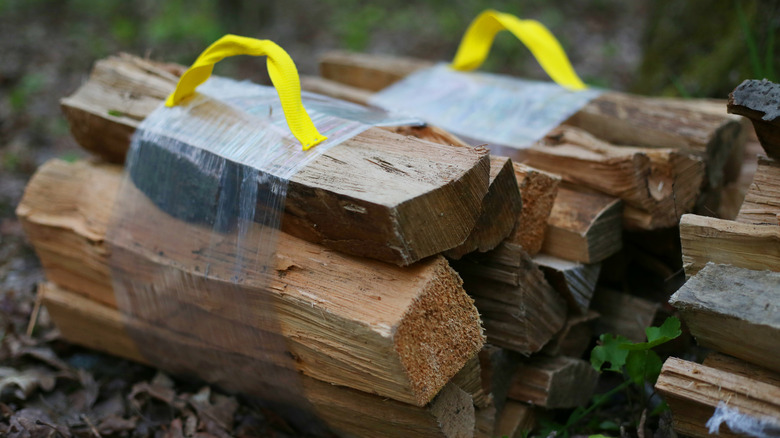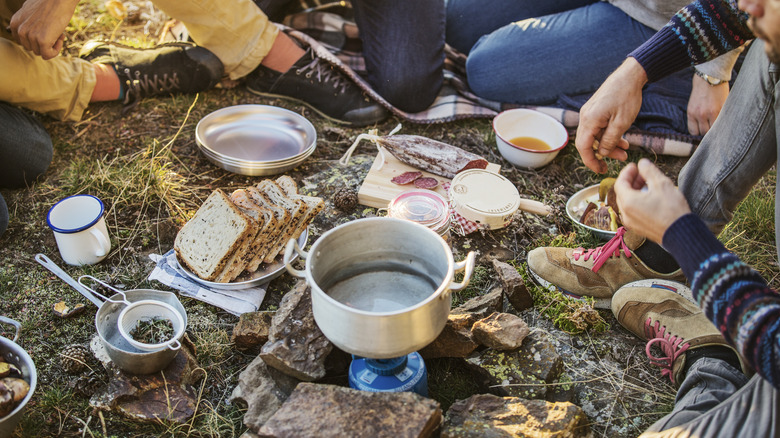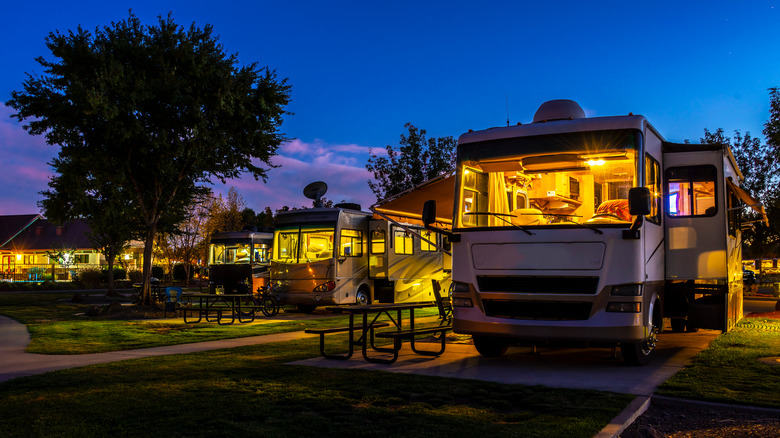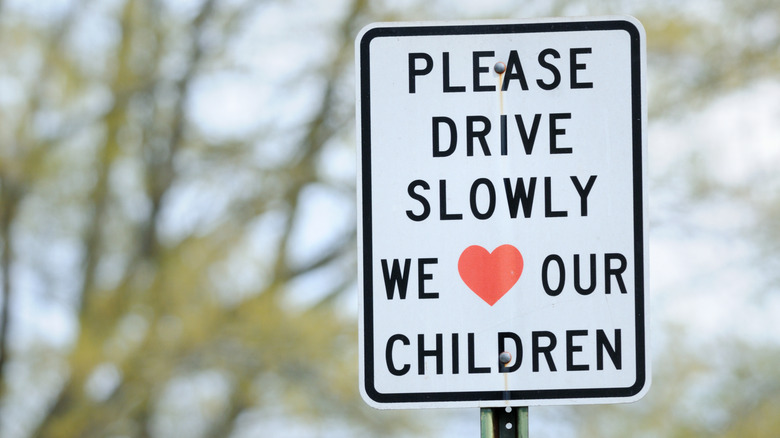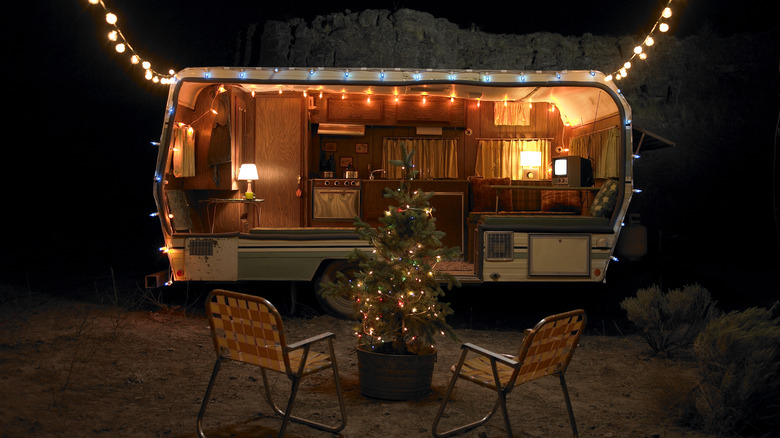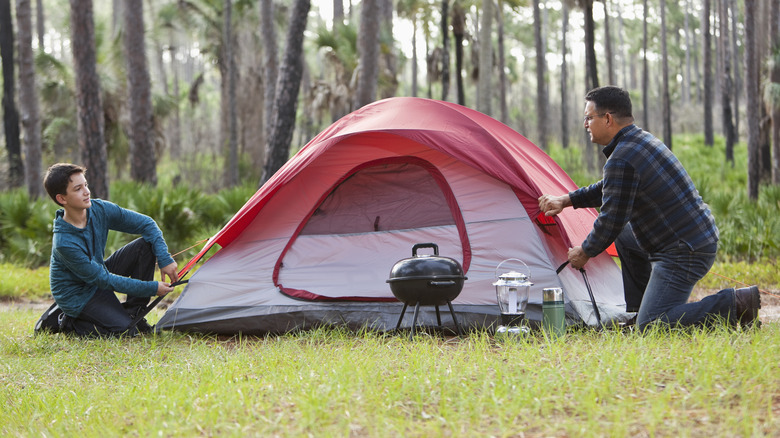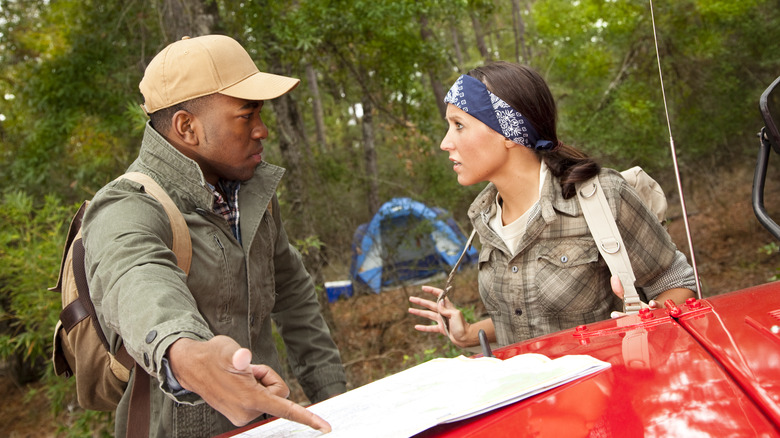Annoying Things You're Doing At Your Campsite That Everybody Hates
Camping is one of the most cherished of all outdoor activities. Not everyone is going to be backpacking into the wilderness just to pitch a tent, however. No, the vast majority of camping is done at campgrounds — a place that is designed to house dozens, or hundreds, of campers. Here's the thing about campsites, though. They come with their own set of etiquette rules, most of which are unwritten.
Though we all like to think of ourselves as considerate individuals, chances are we've all been guilty at one time of annoying our camping neighbors by engaging in activities that break the etiquette rules. If you've ever blasted music during quiet hours, you've been annoying. If you've ever let your dog roam free into another person's campsite — guess what, you've been annoying.
The point is, despite our best efforts, we're all going to do something while we're camping that annoys other people, and vice versa. Still, there are certain acts that no one should commit at a campsite, accidental or otherwise.
Walking through another campsite
Imagine you're at home. You're in your bedroom getting ready for bed, when all of a sudden a complete stranger walks through your room while you're undressing. When asked as to what the heck they're doing there, the intruder says that they are simply taking a shortcut back to their place. No doubt you would be incredibly livid about this violation of your privacy, right? Of course you would. So, keep this situation in mind the next time you're tempted to cut through a campsite that isn't your own.
Taking a shortcut through a neighbors campsite is tantamount to trespassing, and is just about one of the rudest things you could do to a fellow camper. When someone occupies a campsite, that site is their respective home for as long as they are there to enjoy it. They want to be able to sit and relax without being interrupted by you storming through constantly. Once might be taken as an honest mistake. But walk through the same site multiple times? That's just not done.
Unless those occupying the campsite happen to be your friends, or you have express permission to walk through it, do not tread on the carpet. Tracking through another person's campsite is a fantastic way to make an enemy. And having enemies can really turn your camping trip sour.
Blasting music
Now, someone with a tolerant or patient nature might forgive an accidental slip in camping etiquette here and there. But if there is one thing they absolutely will not tolerate, it is blasting music. Even during the day, loud music cutting across the campsite is going to rub people the wrong way. It may come as a shock to those playing said songs, but not everyone shares your particular taste in music. It doesn't matter if it is the latest Drake album or Tchaikovsky's 1812 Overture. If your music is too loud, you're going to make someone mad.
Nowhere is this more true than when music is blasted at night. Folks may be willing to tolerate your music during the day, but when the sun goes down, you'd better turn it off. Camping is not like living indoors. You are out in the open, where sound will travel unimpeded through the campsite so that even someone on the opposite side will be able to hear your music if it is being played too loudly.
There are two remedies for this. You either shut your music off, OR plug in some headphones and keep your music to yourself. It is the right thing to do simply for the sake of being respectful of those around. Your fellow campers are here to enjoy themselves, not be constantly annoyed by your presence.
Smoking
Most people who smoke already do this, but it is worth repeating because there is always someone who doesn't. Just as not everyone wants to hear your particular brand of music, not everyone wants to smell whatever it is you are smoking. It doesn't matter if it's cigarettes, cigars, tobacco pipes, vaping, or a certain green substance, the scent that results is likely going to be enough to drive many of your fellow campers absolutely crazy. Especially if your neighbors happen to be parents with young children.
So, what can a smoker do? Well, a lot of campgrounds have outright banned smoking, but many campsites will have a designated smoking zone that is situated away from the main campground. You can do your puffing there — just make sure you dispose of your product properly. Any smoking product that is not properly put out can be a major fire hazard, especially when it is hot and dry outside. And how many friends do you think you're gonna make if your improperly dampened product starts a fire?
Though you might think you can get away with sneaking a smoke early in the morning before other campers are awake, people's noses are sensitive enough to know the difference between the smoke from a campfire and the smoke from a smoking implement. Therefore, if you smoke, please be mindful of those around you, and keep your smoking to the designated zones.
Unsupervised canines or kids
If you have children, are the proud owner of a four-legged canine, or have both, don't let them run wild. Allowing your kids or dogs to run free, without supervision or consequence, is yet another great way to get everyone at the campground hating your guts. Don't get us wrong, your kiddos and pups can play. They just need to be supervised, and kept in line with the campground rules.
It can be easy to just let kids wander about the camp. This is fine with well-behaved older kids and teenagers, but not young ones. Imagine if your kid trespassed into the neighboring campsite, started messing around with their camping equipment, and got hurt? You, the neighbor, and the kid would all be really upset. Remember, the campground is not your backyard. Kids could very easily find themselves in potentially harmful situations if not monitored by a parent or other familiar adult figure.
The same is true for dogs. Most campground rules will state that the dogs need to be on a leash at all times, and they could come with additional barking ordinances aimed specifically at dogs who bark incessantly during the night. If you have a dog that is particularly aggressive, leave it at home. Oh, and do everyone a favor. Clean up after your dog. If you allow your dog to relieve themself in another campsite, and don't clean it up, that waste may magically find its way into your sleeping bag.
Cutting down trees for firewood
While it may be acceptable to cut down trees for firewood on your own property, and while you might think you're doing the other campers a favor by harvesting some local firewood, there are plenty of reasons not to cut down trees at a campsite. First among which is the fact that it is illegal. As the visitor to the campground, you have absolutely no legal authority to cut down a campground's trees, especially if the campground happens to be on conservation land. Forcefully removing a tree harms the overall ecosystem of the campground, and has the potential to cause lasting damage.
Secondly, the process of cutting down a tree can be, once again, noisy and rude. No one wants to hear you sawing your way through trees at various hours of the day. You're far better off buying firewood at the camp office or scavenging for branches and twigs that have already fallen. If it is already on the ground, there is absolutely no issue at hand. The wood is dead and nothing is using it to make a home. Therefore, it is free for you to use.
Bringing your own firewood
Here's another bad thing you could be unknowingly doing when you go camping: bringing your own firewood. This is a big no-no for a lot of campsites. Unless otherwise stated, you should never, ever, bring your own firewood. Here's why.
Wood that travels between states or regions can carry with it fungi, pests, and bacteria, all of which are completely foreign to the landscape the wood is now entering. By bringing this wood, you are allowing the transfer of disease and pestilence to the campsite. This in turn has the potential to do serious harm to the camp's ecosystem. What is natural for your area might not be natural even 10 miles away. What should you do instead?
Instead, you should buy certified, heat-treated firewood, or purchase your firewood from the camp office. Most larger campsites will have an area where you can collect bundles of firewood for a few dollars a-piece. This is firewood that has been certified by the state or entity running the campsite as safe for burning. So, while it may cost some money, you are avoiding potentially destroying an ecosystem by leaving your own firewood where it belongs: at home.
Leaving food out
A well ordered and organized campsite is going to be easier to move around and find things in. This organization includes the proper storage of and equipment for food. And the one thing that you absolutely must do every single time you are planning to leave your campsite for any period of time, is to clean up and put away your food.
Food needs to be secured, period. Whether that is back in your car, RV, or in a bear locker provided by the camp doesn't really matter. The point is that it is double secure. Any perishables you bring with you need to be put back in your cooler, and the cooler needs to be put in a safe and secure place. Because, as countless reports and videos have shown, most coolers are just no match for a bear.
Do you really want the knowledge that you let a bear wander into camp on your conscience? All because you were too lazy to put away your food from the other night? Bears, and other creatures for that matter, are attracted to a whole manner of different foods, and they won't hesitate to dig through trash or coolers. Bears are very dangerous animals that should not be approached under any circumstances. So, doing something as seemingly innocent as leaving food out could actually lead to a very dangerous situation for the entire campground.
Not respecting quiet hours
Respect for others is a big part of having a good camping trip. Most people are out to escape the cacophony of their everyday lives. They want to relax and rest. What they don't want is to be woken up well into quiet hours by incessant laughing, intoxicated behavior, loud music, and other types of sounds that can echo into the night. Respecting quiet hours is one rule so many campers either forget, or downright neglect to follow.
Many campgrounds maintain quiet hours from 10 p.m. to 7 a.m. These coincide with the hours when most people are sleeping, or at least trying to. Think about when you are trying to sleep. You really don't want to be disturbed by anything unless it is an absolute emergency, right? Listening to someone in the next campsite loudly pontificate their life story at 1 a.m. would not be your idea of relaxation or respect, would it?
So then why are you playing your music or engaging in overt revelry during quiet hours? Now, if the park comes with rangers and someone files a complaint about your violation of quiet hours, you will be warned to stop. If the offense continues, however, you will very likely be kicked out of the campground. Quiet hours are a serious business. Be respectful and don't violate them.
Ignoring speed limits
We've compared a campsite to a suburban neighborhood a few times already on this list, mostly because there are striking similarities. You don't want someone to be walking through your yard without permission. You don't want someone's dog pooping in your yard without it being picked up. And you certainly don't want people zooming down the street well above the speed limit, especially if there are kids running around. The same is true at a campground.
Nearly all campgrounds have access roads that connect the various camping areas. Like standard public roads, these camp roads come with speed limits. And these limits need to be respected, not just out of courtesy, but for safety. Camp roads are not terribly wide, and are often filled with other adult campers, and children. By keeping the speed limit, or going significantly under it, you decrease the likelihood of getting into a fender bender.
Even if there is no one on the road, respect the speed limit. A child or pet could run out into the road at any moment. And the second you hit someone's kid or pet with your car, you're in deep water.
Leaving campfires unattended
Another aggravating thing people do while camping, that is also a massive danger, is to leave campfires unattended. The potential for the fire to grow out of control and spread throughout the campsite is a very real danger. Wind blowing is fuel for a fire. Even if it is just left to the burning cinders, the heat from that has the potential to set other things alight. What if one happens to roll out of the fire pit and slides up against your neighbors tent?
You always need to put your fire out before you plan on leaving your campsite or are heading to bed. Water is the best way to go about this. It yields some smoke at the start, but it quickly dissipates. The water prevents any coals from reigniting, and will cool the fire down to a point where it is no longer dangerous.
The reason unattended campfires are aggravating for a lot of other campers is because of the fact that those who leave their campfires unattended are nonchalantly endangering others. It's a blatant disregard for the safety of your fellow campers, and it honestly makes folks feel like you do not care about their well being. So, put out your fires, please.
Leaving lights on
This one is for anyone who is camping with an RV or uses string lights at their campsite. Once quiet hours are reached, or whenever you go to bed, those lights need to be turned off. Light pollution is a very real thing, meaning that it can stretch across the campground to other campsites, and prevent people from sleeping soundly. Even a little light far off in the distance can prevent people from having a decent night's sleep.
Make a habit of turning off your lights whenever quiet hours approach, or at the very least dim them to the point where they will not be an issue for other people. This is easier to do with lanterns than it is with string lights, though there are some that come with dimmers. If you want to read or would like to keep up with some quiet activity while others are sleeping, headlamps are also an excellent option. You could also retreat to the comfort of your tent with a small amber lamp or the like. The tent will dim the light enough for it not to bother other campers.
As you've seen, a lot of these unwritten rules boil down to simply being respectful to your fellow campers. Be mindful, and think: if it would annoy you, it is likely going to annoy someone else.
Setting up too late or breaking down too early
Setting up too late or breaking down too early could really aggravate your fellow campers. Imagine that the quiet hours are still in place, and people are very noisily trying to set up or break down camp. Headlights could be streaming into your tent. Trunks and pots and pans could be banging around. And you'll, no doubt, be annoyed that these people didn't have the courtesy to leave their work until normal hours when there is actual light outside.
Now, there will undoubtedly come a time when you need to set up your tent later than you'd like, or leave camp early. Try to pack or unpack as quietly and politely as you can. Use your headlamps instead of your car lights, set up or break down your tent, and pack or unload your car all quickly and quietly.
Your fellow campers will likely be watching you do this. If you show that you're mindful of them, they are very likely going to be okay with your efforts at being quiet. And besides, it is good to be mindful of your fellow campers. They are likely sleeping or still enjoying their time at camp. It is best not to ruin that simply by being inconsiderate.
Pitching tent in a reserved campsite
How mad would you be if you got to camp and someone had set up shop in your reserved campsite? Worse still, what if they refuse to move? We've seen a lot of rude behaviors on this list, but this may just be the most annoying. It depends upon the campsite, obviously, but most will have numbered sites that can be reserved well in advance of your actual trip. If you set up your camp on a site that another person has reserved and paid for, you're being inconsiderate, or another choice word we won't repeat here.
You should never do this. Check and double check the number on the campsite to avoid any confusion. Remember, someone has paid for that site. They, and they alone, have permission to camp there. Not you.
There are plenty of other annoying things that people do at campsites, but that list could stretch into infinity. The ones presented here are those that are the most egregious camping etiquette breaches. Honestly, it is hard to tell exactly what will and will not annoy people. If you are having trouble figuring out what someone else might find aggravating, think about whether or not you would. It is as simple as that.
